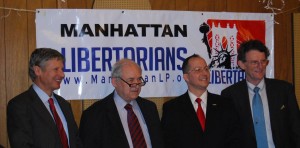
One of the problems with modern election campaigns is that the media tend to focus almost exclusively upon mainstream political candidates, which means men like Mitt Romney and Newt Gingrich. Fortunately, the advent of the World Wide Web has allowed those with limited media exposure to disseminate their message to a much broader audience. One week ago I had the opportunity to attend a candidates’ forum sponsored by the Manhattan Libertarian Party, which was holding its annual convention in the lead-up to this year’s presidential election at the East Village Ukrainian Restaurant. None of the candidates on stage is a household name, with the possible exception of Gary Johnson-and even in his case, it’s doubtful that more than a small percentage of political wonks is aware of his candidacy. However, the openness of the Internet-at least for the time being-has allowed each of Johnson’s opponents, Carl Person, Bill Still, and RJ Harris, to bypass the normally money-intensive, press-centric channels of ingratiating themselves with prospective voters.
However, before turning our attention to the presidential forum, let’s examine some of the issues addressed by that day’s introductory speakers. Jim Babb, libertarian activist and creator of the popular anti-TSA website We Won’t Fly, spent most of his speech exploring how members of the liberty movement could persuade the American public that ceding innate rights to agents of the state-no matter how benign the ostensible goal of government policy-makers might seem at first blush-is a recipe for tyranny. His focus, of course, was the habitual harassment of passengers and violations of civil liberties by the Transportation Security Administration in our nation’s airports, which seem to have become Constitution-free zones, excluding celebrity paparazzi. The repeated abuses of this branch of the Department of Homeland Security-whose Orwellian title belies the incompetence and ineptitude of its chief administrators-have been well catalogued. From the humiliating strip search of one of its chief congressional critics-an octogenarian WWII veteran-to the more recent detention detainment of Senator Rand Paul, to the emotionally scarring interrogation of a cancer survivor forced to remove her prosthetic breast, to the utterly humiliating experience of an elderly grandmother wearing a colostomy bag, to the mind-boggling decision to blast a mother’s breast milk with high doses of radiation, the abuses of the TSA are legion…and ongoing.
As was pointed out during the course of his speech, these intrusive, utterly demeaning experiences are the only encounters, except perhaps for an excruciating wait in a DMV office line, ordinary citizens have with the true face of state, and it isn’t pretty. The invasive searches and unconstitutional deprivation of rights airline passengers experience on a regular basis provide an opportunity for education though, because they illustrate the pervasive nature of government control while also highlighting its ultimate futility. Babb summarized this perspective succinctly with the line, “If you think the TSA is intrusive, just imagine filing an income tax return.” This quote is valuable because it illustrates an essential truth. Namely, that these “security” measures have absolutely nothing to do with ensuring security, rather they are used as a means of control-just like the confiscation and redistribution of earned income in this country-and a way of inducing mass docility among the populace. That’s why the events organized by We Won’t Fly-which would not have generated nearly the attention they did without the Internet-are so important as an educational tool. Although Babb acknowledged there hasn’t been much progress at the federal level in rolling back the scope of TSA authority-let alone abolishing the agency altogether-there have been statewide efforts at limiting the abuses inflicted upon Americans at the hands of this horrific government agency, most likely because of the activism promoted by organizations like We Won’t Fly. That there have been Ban the Scan rallies and is growing support for protests like National Opt Out Day gives me hope that the message of resistance against arbitrary government tyranny is spreading.
On a more philosophical level, Carl Oberg, of the Foundation for Economic Education, emphasized the need to expose youths to a message of classical liberalism as they grow up. Castigating both the system of public education and private schooling, Oberg described the difficulties of conveying a message of free market ideas and choice within an institutional framework where even the concept of capitalism as a potential economic and social solution is anathematized. In addition to public speaking engagements to high schools and colleges across the country, he cited the distribution of works such as I, Pencil, the capitalist manifesto written by FEE founder Leonard Read, and The Freeman, FEE’s flagship publication, as means of educating the general public about the ideas espoused by his foundation. Whether political education is a more efficacious means of turning people into libertarians than political activism-or merely a complement-remains to be seen.
The capstone of the evening, the candidates’ forum, touched upon many of the subjects brought up by earlier speakers, but also focused on a broad array of issues that mainstream presidential candidates have debated in the past few months. The most interesting dynamic at play from my perspective was the clear division between some of the candidates on stage. Perhaps I should have expected discord-at least on policy matters-from a party that’s notorious for its difficulties in finding a unifying presidential candidate, but the spirited back and forth, especially between Gary Johnson and Carl Person, was a relief. The latter spent much of his time attempting to discredit the record of the former while touting his own record of creating jobs. Person repeatedly emphasized the necessity of connecting with an electorate that is searching for long term plans for economic growth and job creation, not merely a regurgitation of libertarian talking points, no matter how necessary the changes proposed by more ideological candidates like Gary Johnson might be. Person also implicitly criticized the notion of nominating a former high-ranking elected official in one of the major parties in order to appeal to a broader electorate, correctly pointing out that the last time this was attempted, with former Republican congressman Bob Barr, the Libertarian Party not only failed to increase its share of the vote but in the process alienated many deeply committed LP members who supported party activist Mary Ruwart.
Johnson defended his record by recounting his work as an handyman in New Mexico, an experience which eventually led to the creation of a multimillion dollar construction business that provided the seed money for a successful run for the governorship of the state. He framed the issue facing the President as one of whom to fire, not hire, and asserted that he would submit a balanced budget upon taking office-vowing to cut entitlement spending drastically while at the same time drawing down on overseas commitments, although not to the extent promised by libertarian Republican presidential candidate Ron Paul. Perhaps the most surprising element of his pitch to the audience was his support for the Fair Tax, an idea that has been condemned by some libertarian economists as being a stalking horse for the introduction of a VAT and an added revenue stream for a federal government seeking to supplement the income tax, a la the Alternative Minimum Tax.
Bill Still, yet another presidential aspirant, focused almost exclusively upon monetary policy during his speech to those assembled at the East Village Ukrainian Restaurant. Going beyond the aims of the End the Fed movement inspired by Ron Paul, which has gathered steam as a result of Occupy Wall Street, Still argues for the complete abolition of fractional reserve banking, even praising populist Democratic presidential candidate William Jennings Bryan in his closing remarks. Of course, this elicited guffaws from some of the anarcho-capitalists in the audience.
RJ Harris was perhaps the most conventionally libertarian candidate on stage, repeatedly emphasizing his commitment to civil liberties, including his opposition to the NDAA and SOPA. He also touted his previous experience running for office in his home state of Oklahoma, including a congressional campaign that garnered the endorsement of Senator Rand Paul. Perhaps the most interesting aspect of Harris’s candidacy is that he is supporting another presidential candidate this election cycle. Namely, Ron Paul. His rationale for running is that there needs to be a liberty candidate on the ballot should Congressman Paul lose the GOP nomination, and in fact, his dedication to the libertarian cause manifested itself during his speech, which he concluded by urging members of the audience to contribute to any of the candidates he was sharing a stage with, including his opponents.
Perhaps the most intriguing point of dispute between the four candidates revolved around the subject of immigration. While most people view the Libertarian Party as monolithically supportive of open borders-an impression that’s no doubt reinforced by the position espoused by libertarian mouthpieces such as Reason Magazine and the Cato Institute-the four presidential candidates vying for the LP nomination differed sharply on the questions of border security and immigration controls. Gary Johnson reiterated his well known opposition to any restrictions on immigration and rejected the very notion that a fence or wall could serve as an effective deterrent to border crossers-prompting a humorous interjection from an audience member who asked him why people in East Germany weren’t aware of this incontrovertible fact. RJ Harris,while not in the same open borders camp as Johnson-in fact, averring that those National Guard troops now policing the AfPak border should be patrolling our own southern border-still emphasized the necessity of having an extremely generous immigration policy, sans the existing welfare state model that promotes dependence upon the state by newly arrived immigrants. On the other hand, Carl Person emphatically stated his support for states rights on this matter, denouncing the Obama administration’s lawsuit against Governor Jan Brewer and the people of Arizona, and in a nod to federalism declaring that laws like SB 1070 should not be subject to federal intervention. Finally, Bill Still unequivocally rejected the immigration plank of the LP platform, replying to a question about this issue by asserting that he was in favor of “sovereignty.”
This exchange, perhaps more than any other, demonstrated the wide variety of opinion that exists within the Libertarian Party, and signaled that perhaps the gulf between those in the immigration enforcement and reform movement and ideological libertarians is not as wide as it appears at first glance, a subject that we’ve explored recently on this very website. In any case, the upcoming presidential race will provide an opportunity for all of these candidates to compete for the affections of libertarians and-considering the fact that the Libertarian Party will be on the ballot in all 50 states-American voters.

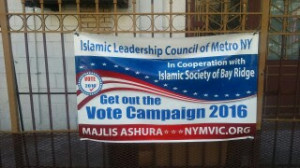
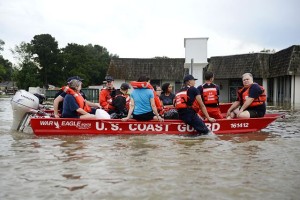
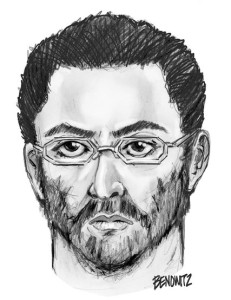
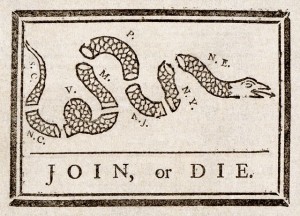


Excellent commentary.
Thanks Gerard.
Glad you could join us.
You forgot to hyperlink Gary’s name like the others’. http://www.GaryJohnson2012.com
An oversight on my part-since corrected. Thanks for bringing it to my attention, Derek.
Gerard, you did a fantastic job capturing the essence of the event. Very well done! FYI: Carl Person’s new website is http://www.carlperson2012.com.
Thanks, Chris. I’ll update the hypertext link in the article.